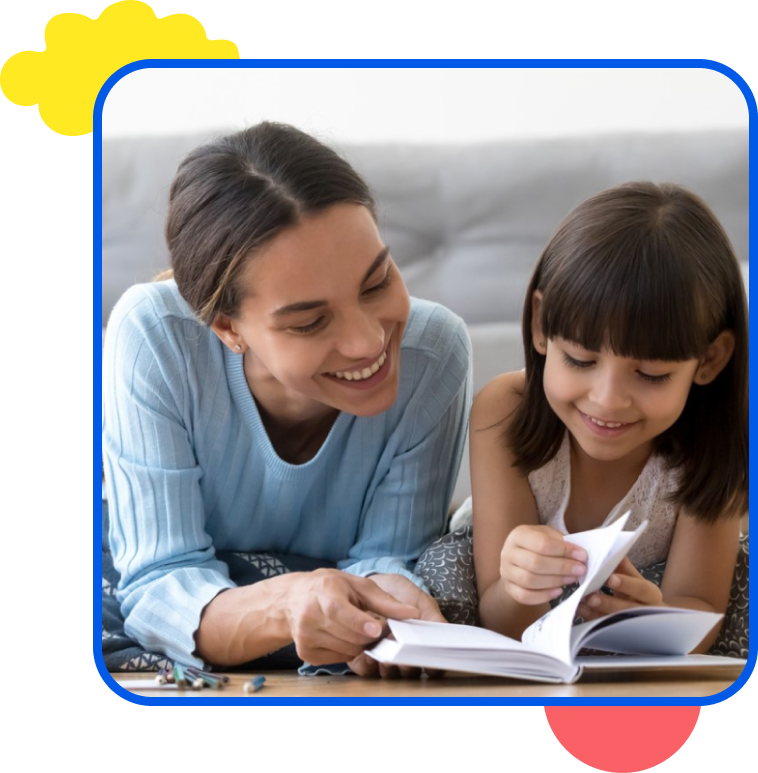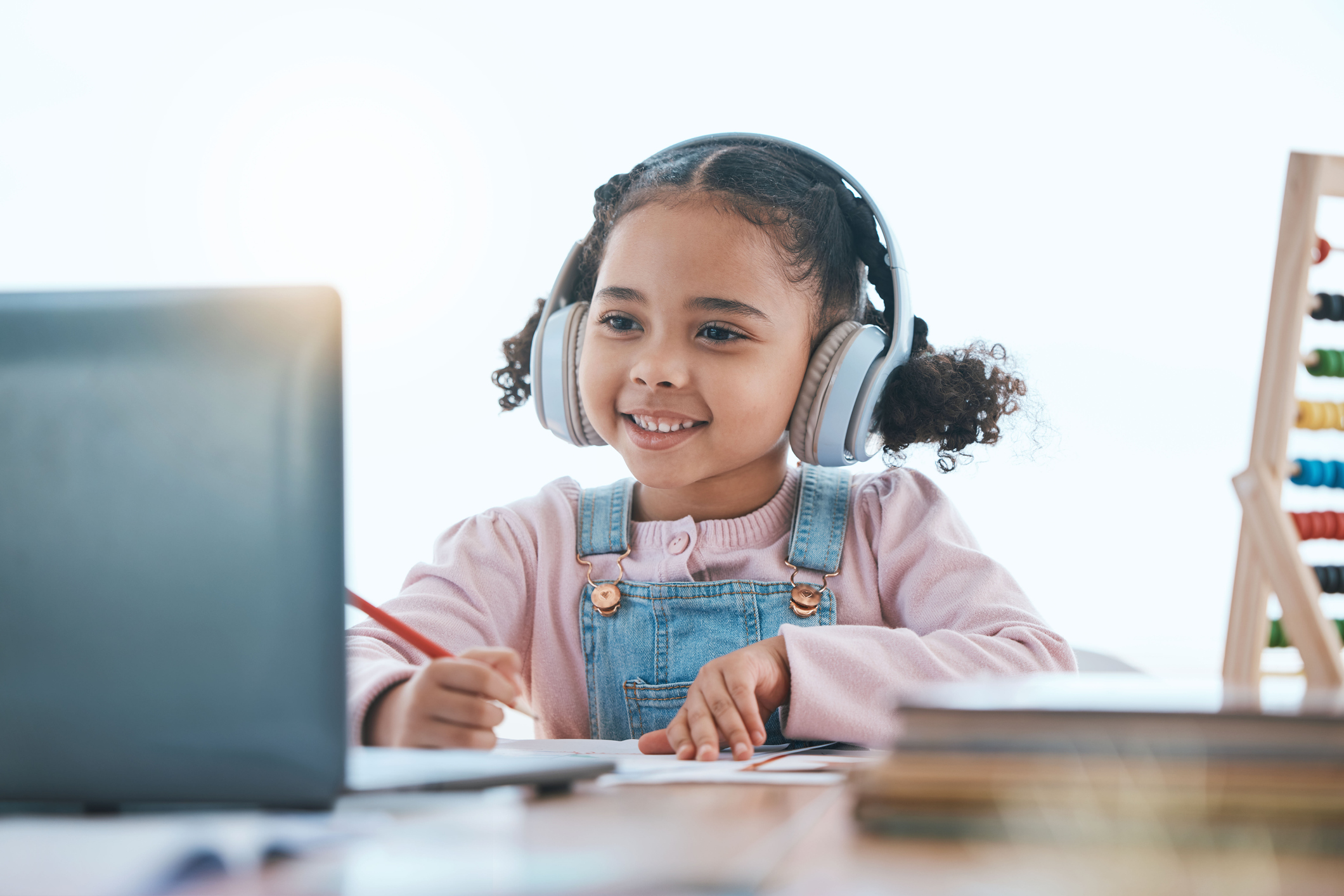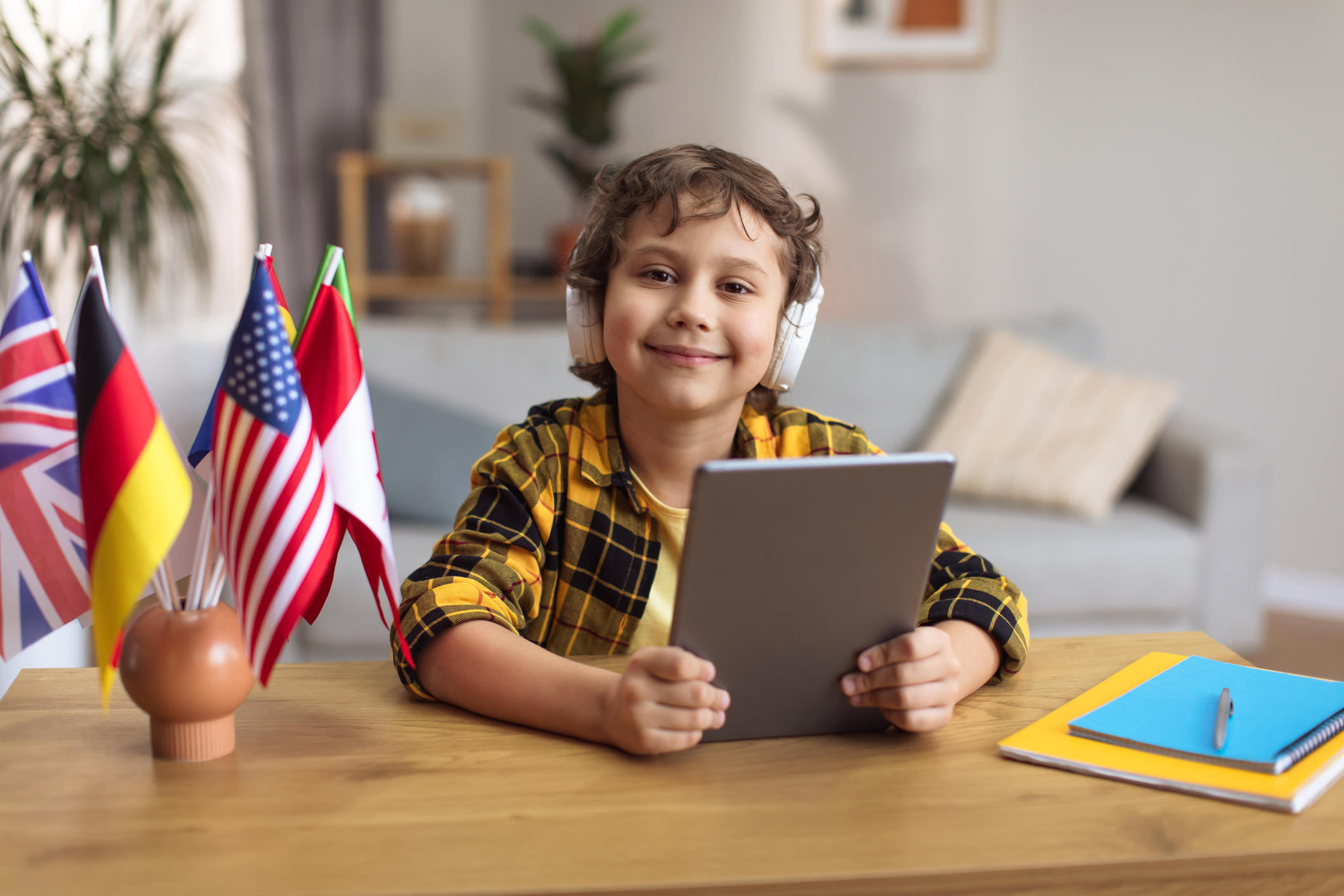8 of the Best Language Learning Apps for Kids



Parents looking for the best language learning apps for kids need look no further! In this blog post, we’re sharing a list of 8 apps that are perfect for children who want to learn popular foreign languages like French, Spanish, and Mandarin Chinese.
Just one question before we begin: are language learning apps the right approach for parents aiming to raise a bilingual child? Sometimes yes, sometimes no. It really depends on what goals you and your child have for language learning.
So, let’s start by taking a look at the pros and cons of language learning apps for kids before going through the list!
The Pros and Cons of Language Learning Apps for Kids
Here are the major pros and cons of language learning apps for you to consider.
Pros of language learning apps
- Fun and interactive. Many of the best language learning apps for kids use games and other engaging activities to teach basic vocabulary and phrases. This can make learning a new language much more enjoyable than learning from a textbook.
- Convenience and flexibility. With language learning apps, children can study whenever and wherever they want, for as long or short a time as they like.
- Free or low-cost. Compared to traditional foreign language classes, language learning apps are much cheaper and, in some cases, they’re completely free to use.
- Options and variety. Not only are there many language learning apps for kids to choose from, but there is also a wide range of languages to learn. This is great if your child is learning a language that isn’t commonly taught or studied in your area.
Cons of language learning apps
- Lack of human interaction. Most language learning apps fail to provide opportunities to learn, ask questions, AND speak the language with a native speaker of the target language.
- Hard to learn beyond the basics. While apps can provide a great introduction to the basics of a language, they’re not always the best at teaching more complicated grammar rules and vocabulary.
- Requires a lot of self-discipline. When it comes to language learning, consistency is key. And while some language learning apps send study reminders, it’s common for people (especially children) to lack the self-discipline to stick with language learning using apps alone.
- Easy to be distracted. When using an app, your child is just a few clicks away from big distractions like YouTube, video games, and much more. This can make it hard for children to focus on learning a language.
8 of the Best Language Learning Apps for Kids
Even if they’re not perfect, there are some great language learning apps! Your child can use one or more of them to learn the basics of a new language and/or to supplement what they learn in a more traditional classroom setting. Here are 8 apps you and your child can try.
#1 Babbel
Babbel is one of the best language learning apps for kids because it’s designed to make learning a new language fun and engaging. There are mini-games and other activities that help reinforce what your child is learning. The app offers instruction in languages like Spanish, French, and German. It is available on the Apple App Store and Google Play Store.
Learn more by reading our Babbel French review.
#2 Droplets
Droplets is a language learning app for kids that is focused on teaching vocabulary through visual learning. The app features short lessons (5 min or more) or games for your child to make quick progress in learning vocabulary in different categories, such as animals, food, and transportation. On this app, your child can learn languages like French, Japanese, and Mandarin Chinese. The Droplets app is available on the Apple App Store and Google Play Store.
#3 Gus on the Go
Gus on the Go is a language learning app for children that has lessons in 30 languages, including French, Spanish, German, Mandarin, and English. Each lesson contains 10 simple words that children can learn in fun, interactive, story-based game sessions. Gus on the Go is available on the Apple App Store and Google Play Store.
#4 Rosetta Stone
Rosetta Stone has existed for a long time and now offers its programs on an app for language learners. The programs offer a comprehensive language learning experience with lessons in multiple languages, including French, Spanish, and Italian. The app also includes pronunciation practice sessions, live tutoring sessions, and progress tracking tools. Rosetta Stone is available on the Apple App Store and Google Play Store.
#5 Duolingo
Duolingo aims to be the best free language app. The app offers short and effective lesson plans to learn key vocabulary, phrases, and grammar in many languages, including French, Spanish, and German. It also uses “streaks” to boost motivation.
In addition to the regular app, Duolingo for School can be downloaded for free and offers a way of tracking and checking student progress. Parents or teachers may restrict the vocabulary to a specific age. Duolingo is available on the Apple App Store and Google Play Store.
Learn more by reading our Duolingo French review.
#6 Peg and Pog
Peg and Pog is a language learning app that’s based around the story of two kids who travel the globe and learn languages along the way. As they explore new scenes in their own home, they learn vocabulary. Peg and Pog is available in English, Spanish, French, German, Italian, and Portuguese. The app is available on the Apple App Store and Google Play Store.
#7 Memrise
Memrise is an app that uses memorization techniques, like spaced-repetition learning, to help users learn vocabulary and key phrases in a foreign language. Memrise has designed courses in several languages including French, Spanish, German, Japanese, and Mandarin Chinese. Users of Memrise can also create their own courses, which can be of varied quality. Memrise is available on the Apple App Store and Google Play Store.
#8 Dinolingo
Dinolingo is a language learning app & website for kids. It is available in 50 languages with over 30,000 online activities. Dinolingo’s online portal is 100% safe and secure. No ads, no pop-ups, no chat rooms. Their dashboard allows real-time parental controls to monitor the child’s participation and progress. Dinolingo is available on the Apple App Store and you can visit them on their website.
Final Thoughts
There are some definite advantages to using language learning apps with your kids, even if they’re not perfect. There are, however, also some limitations to keep in mind — especially when it comes to young children using these apps to learn a new language.
That’s why we recommend pairing your child’s use of a language learning app with regular language classes with a native-speaking teacher. That way, they can enjoy all the pros and avoid all of the cons of learning from an app!
If you want a convenient way to start regular language classes and get the most from the apps, check out LingoCircle! We’re an online language school (for children ages 3-15) that helps children enjoy the benefits of bilingualism in early childhood. Get your child’s first lesson free by registering for a trial lesson today!

Are you using YouTube to help your child learn French? You should be! YouTube is a great place to find free music, nursery rhymes, educational videos, TV shows, and more in French. And, as you probably know, kids love YouTube!
That’s why, in this blog post, we’re sharing 9 of the best French YouTube channels for kids. As a parent, you can use this list to find free video content in French that is perfect for your child’s age and level of learning.
We’ll also discuss why YouTube is such a great resource for language learners and how to help your child use it to its full advantage. Let’s start there right now!
Why YouTube Is Great for Language Learning
There are many benefits to using YouTube as a resource for language learning. Here are some of the top benefits for children.
- It’s free, accessible to anyone with an internet connection, and has a wealth of content to choose from!
- By watching videos on YouTube, children can improve their French skills by learning vocabulary and grammar concepts in a fun, visual way. This is particularly useful for toddlers and younger children who tend to have shorter attention spans.
- YouTube is also a great way to learn about a culture. By watching videos from French YouTubers, children can get a glimpse into what daily life is like in France and other French-speaking countries.
- When learning a foreign language it’s important to expose children to native speakers as much as possible. Unless you live in or travel to a French-speaking country, that might be difficult. YouTube makes it possible for your child to listen to native French speakers without leaving home!
How to Use YouTube for Language Learning
There are few ways that you can use YouTube to help your child learn French.
One method is to watch French cartoons with French subtitles and then have your child read and repeat the phrases. This will help them learn proper pronunciation. You can also have your child check their comprehension level using English subtitles.
Another way is to find videos that focus on teaching specific grammar concepts or vocabulary words. You can then pause the video and have your child try to say the words or phrases themselves.
Similarly, you can find French songs for kids to watch and sing along to. This is great for making sure your child has fun while learning French.
Lastly, you can use YouTube to find videos that display everyday life in a French-speaking country. This will help expose your child to French culture.
How to Choose the Right YouTube Channel for Kids
It’s important to make sure the channel is appropriate for your child’s age group. Some channels are geared towards younger children while others are better suited for older kids.
It’s also important to look for channels that offer content that is interesting and engaging for your child. If a channel is boring or difficult to understand, your child is likely to lose interest quickly.
To help you choose the right YouTube channels for your kids, we’ve compiled the list below!
9 of the Best French YouTube Channels for Kids
#1 The French Minute
The French Minute makes videos about the French language that are concise and educational. The channel is great for kids who are looking to learn more about French grammar, vocabulary, and culture.
#2 Monde des titounis
Monde des titounis is another great channel for little kids learning French. The videos on this channel are educational, entertaining, and cover a wide range of topics to help your child pick up French vocabulary.
#3 BASHO & FRIENDS!
The BASHO & FRIENDS! YouTube channel isn’t specifically dedicated to learning French, as they also have videos in English and Spanish. But this channel does have a lot of great content for kids learning French, including songs, stories, and educational videos.
#4 Learn French Through Music
Learn French Through Music is a YouTube channel that, as the name suggests, uses music to teach French. This channel is another great resource for younger children who are just starting to learn French.
#5 French with Mr Innes
French with Mr Innes is a YouTube channel from a French teacher for beginners. He shares a lot of videos in English and French that explain grammar, teach vocabulary, and help children learn about French culture.
#6 French Fairy Tales
French Fairy Tales is a YouTube channel that features classic fairy tales like Cinderella and Sleeping Beauty. The stories are told in French and have English subtitles, which makes them perfect for kids who are just starting to learn the language.
#7 Petit ours bruns
Petit ours bruns is a cute cartoon show that follows the adventures of a little bear and his friends. It’s perfect for young kids who are just starting to learn how to speak French.
#8 Peppa Pig Français
Peppa Pig Français is a YouTube channel that shares the French version of the popular British cartoon. The episodes are fun and entertaining, making them perfect for young French learners.
#9 Caillou en Français
Caillou en Français is another YouTube channel that has the French version of a popular English-language cartoon. The show is about a boy who goes on adventures to learn new things and is great for children learning how to speak French.
Final Thoughts
YouTube is one of the best free resources available to help your child learn French! As we’ve shared in this post, there are YouTube channels to learn and practice French vocabulary, watch French cartoons, learn about French culture, listen to French songs, and more.
We hope you can use this list to help your child have more fun during their language learning journey. And if you want to help your child really improve their French, consider enrolling in one of our online French language classes for kids at LingoCircle. The first lesson is free!

Do you want to help your child learn French? One fun way to do this is by exposing them to music in the French language!
Not sure where to find French songs your kids will love? We’ve got you covered!
In this blog post, we will be showing you 10 of the best French songs and nursery rhymes for kids, ages 3-8 years old. We’ll also talk about why music can be a great way to help children learn foreign languages.
Let’s start there!
How does music help in learning a new language?
Why should parents consider playing French songs for kids? Well, music helps with language learning because songs are:
- Repetitive. Children can learn new French words and phrases more easily when they are repeated multiple times. Music is great for learning languages because there’s a lot of repetition throughout songs.
- Rhythmic. Children can follow the rhythm of the music and learn new words and phrases at the same time. This is especially true for songs that have a catchy melody.
- Engaging. When children listen to songs in a foreign language, they aren’t just hearing the words. They also have the opportunity to follow along with the lyrics to hear the correct pronunciation.
- Fun. Children are more likely to learn something when they are having fun. Songs are a great way to make learning French enjoyable for kids and the whole family!
At LingoCircle, our teachers use French music during lessons for these exact reasons. So, in the next section, you’ll find our teacher’s recommendations on 10 of the top French songs for kids.
10 of the best French songs for kids
There are many great French songs that can help children learn and practice the language. Here are 10 of the most popular French songs and nursery rhymes for kids.
#1 – J’ai un gros nez rouge
If you’re looking for French nursery rhymes for toddlers, J’ai un gros nez rouge is a great place to start. This song will help your child learn and practice French vocabulary related to the human body and clothing.
#2 – 1,2,3 nous irons au bois
This is another French nursery rhyme to make learning French fun for little ones. This song will help your child learn and practice how to say numbers in French.
#3 – Petit escargot
Petit escargot is another popular French song for kids and toddlers. It’s a nursery rhyme that tells the story of a happy little snail.
#4 – Les petits poissons
Les petits poissons is a catchy French song about a little fish swimming in the water. It’s a simple song that makes it easy for children to sing along.
#5 – Camille la chenille
This popular French song tells the story of a little caterpillar named Camille who dreams of flying like an airplane until one day she becomes a butterfly.
#6 – Dans sa maison un grand cerf
Dans sa maison un grand cerf short French song is about a little rabbit trying to get into the house of a deer. The lyrics are simple, which makes it easy for kids to sing along.
#7 – Jean petit qui danse
Jean petit qui danse is a fun, catchy, and popular French song. The song uses a lot of repetition and human body vocabulary to talk about a man who likes to dance.
#8 – Elle descend de la montagne
Elle descend de la montagne is a popular song for kids about a girl who rides down a mountain on a horse to meet her grandmother. If your child learns this song, they’ll never forget the French words for grandmother and grandfather.
#9 – Ah les crocodiles
Ah les crocodiles is a popular French song that tells the story of a crocodile who goes off to war to fight elephants. This song is a fun way for kids to learn some French vocabulary for animals.
#10 – Si tu as de la joie au cœur
Si tu as de la joie au cœur is a really fun song and a great way to practice French vocabulary for the human body. It’s also one of the songs that English-speaking parents and kids are most likely to recognize and enjoy singing! The song is the French version of the English-language song “If You’re Happy and You Know It (Clap Your Hands)”.
Where to find more French songs for kids
Want to find even more French children’s songs? Or, perhaps, you want some playlists your children can listen to while on the go? Here are a few playlists on Spotify and Apple Music with popular French songs for children.
Spotify
- https://open.spotify.com/album/6mTvYRgmUTXpwS9ZrV50ac
- https://open.spotify.com/playlist/37i9dQZF1E4um0xJ4US4bo
Apple Music
- https://music.apple.com/ca/artist/french-songs-for-kids/289842860
- https://music.apple.com/us/album/favorite-french-songs-for-kids/645763539
Final thoughts
We hope you and your children enjoy singing and dancing along to the 10 popular French songs and playlists we shared in this blog post.
Listening to music is one of the most fun and engaging ways for children to learn and practice a new language. The repetitive and rhythmic nature of music is especially helpful for learning new vocabulary and phrases.
That’s why French music is such an important part of our curriculum at LingoCircle! If you want even more ideas on how to help your child learn French, check out our resource guide for parents Learning French for Kids.
Or, if you’re ready to really take your child’s French language skills to the next level, sign up for a free trial lesson of online French language classes for kids with LingoCircle!

If you are looking for a fun and creative way to help your child learn French, look no further than French cartoons! Cartoons are a great way for children to learn and practice a new language, as they are often entertaining and engaging.
In this blog post, we’ll share with you 24 of the best French cartoons for kids to watch. We’ll also discuss why watching cartoons can be an effective way for children to learn French and where parents can find some of these cartoons online.
So, read on to discover the French cartoons that will help make learning French fun for your little one!
Why Watching French Cartoons Can Help Your Child Learn French
Here are five of the top reasons to get your young French learners watching cartoons:
- Cartoons often use simple language that is easy for children to understand, making them a good resource for improving listening comprehension.
- Cartoons usually contain repetition, which can help children remember new words and phrases.
- French cartoons can be an engaging and memorable way for your child to learn about French culture.
- Most children find cartoons to be enjoyable, meaning that they will be more likely to look forward to watching them as a way to practice the language.
- Watching cartoons in French can be a great way for you to bond with your child and encourage their language learning efforts.
So, where can you find French cartoons online?
Where to Find and Watch French Cartoons Online
These days, many streaming services make it easy and affordable to watch French cartoons online. Here are a few of our favorites:
- Netflix is a great option for streaming French cartoons, as they have a wide selection to choose from. And, if you have a Netflix account already, it will likely be one of the most affordable options as well.
- Amazon Prime Video is another paid streaming service that offers a selection of cartoons in French for kids.
- YouTube is another great option for streaming French cartoons, as many user-generated channels offer a wide variety of shows. And, best of all, YouTube is completely free!
Which cartoons should you watch? Let’s take a look at some of the recommendations from our French teachers here at LingoCircle!
24 of the Best French Cartoons for Kids
Our French teachers often use multimedia resources to make sure our online French classes are engaging and entertaining for kids. So, we asked them for help creating this list!
Here are their recommendations on 24 of the best cartoons to learn French. We’ve also included where you can find some of these cartoons online.
#1 Les schtroumpfs
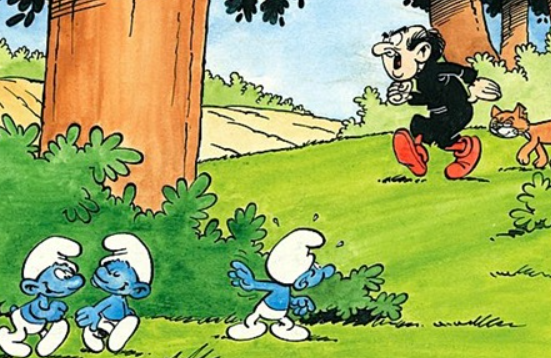
Les schtroumpfs is a Belgian cartoon that originally aired in the 1950s. And we bet you’ve watched or at least heard of the English version! The show follows the adventures of a group of small, blue creatures called “smurfs” who live in a forest. The show is lighthearted and perfect for younger children.
Where to find this cartoon online: Les Schtroumpfs • Français
#2 Le petit prince
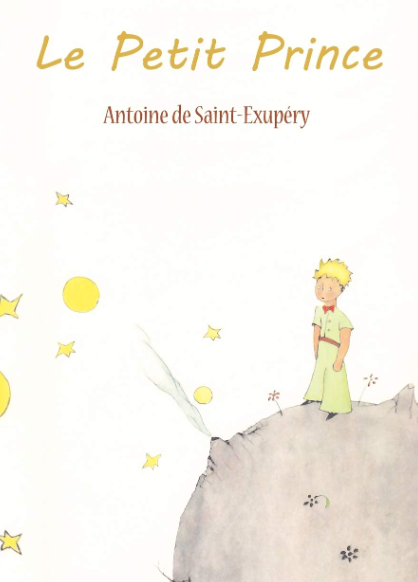
Le petit prince is an animated French cartoon movie based on the book by Antoine de Saint-Exupéry. It tells the story of a young boy who lives on an asteroid and goes on adventures with his animal friends. Le petit prince has beautiful animation and teaches valuable lessons about life and friendship.
#3 Oui-Oui
Oui Oui is a show about a French toy clown who lives in a toy store and has adventures with his friends. The show is aimed at younger children and perfect for beginners learning French.
Where to find this cartoon online: Oui Oui officiel (francais)
#4 Les Trois Mousquetaires
Les Trois Mousquetaires is an adaptation of the classic novel by Alexandre Dumas. It follows the adventures of d’Artagnan, Athos, Aramis, and Porthos as they fight against the evil Cardinal Richelieu. The show is exciting and action-packed.
Where to find this cartoon online: D’Artagnan et les Trois Mousquetaires
#5 Le grand méchant Renard
Le grand méchant Renard is an animated French cartoon series about a fox who tries to outwit the other animals in the forest. The show is funny, charming, and perfect for children of all ages.
#6 Il était une fois… la vie
Il était une fois… la vie is an animated children’s series about the human body. It follows the adventures of a group of cells as they travel through the different systems of the body, learning about how they work along the way. It’s similar to the Magic School Bus, the American cartoon series.
Where to find this cartoon online: Il était une fois… (Hello Maestro)
#7 Astérix
Astérix is a show that’s based on a comic book series. It follows the adventures of a group of Gauls as they resist the Roman occupation. The show is funny, educational, and perfect for children who are interested in history.
Where to find this cartoon online: Netflix
#8 Les aventures de Tintin
Les aventures de Tintin is another show based on a popular comic book series. It follows the adventures of a young reporter as he travels the world, getting into all sorts of trouble. The show is perfect for children interested in adventure stories.
#9 Caillou
Caillou is a show your kids may already be familiar with as there is also an English version. The show is about the daily life of a little boy who learns new things every day. The show is perfect for children interested in learning about different topics.
Where to find this cartoon online: Caillou en Français
#10 Ernest et Célestine
Ernest et Célestine is an animated movie about the unlikely friendship between a bear and a mouse. The movie is heartwarming and perfect for children interested in stories about friendship.
#11 Kirikou
Kirikou is an animated feature film about a young boy who has to save his village from an evil sorcerer. The movie is exciting and perfect for children interested in stories about good vs. evil.
#12 Azur et Asmar
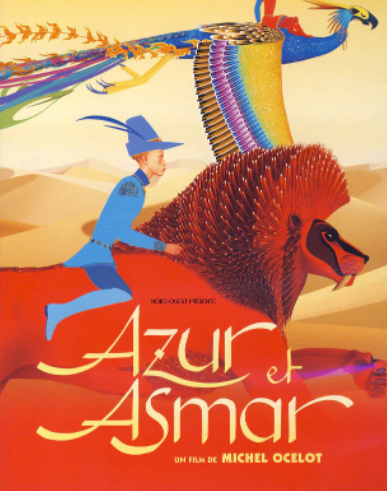
Azur et Asmar is an animated movie about two princes raised by the same woman. One of the princes is from the land of Azur and the other is from the land of Asmar. The movie is perfect for children interested in stories about different cultures and magical worlds.
Where to find this cartoon online: Netflix
#13 L’enfant au grelot
L’enfant au grelot is an animated short film about a little boy who goes on a journey to find a lost lamb. This short cartoon film is perfect for children interested in stories about courage and adventure.
#14 Petit Ours Brun
Petit Ours Brun is an animated French cartoon about a little brown bear who goes on adventures with his friends. The show is perfect for children interested in stories about friendship and exploration.
Where to find this cartoon online: Petit Ours Brun
#15 La grande migration
La grande migration is another animated short film. It’s about a group of animals who migrate to a new home. The short cartoon film is perfect for children interested in stories about nature and working together.
#16 Monsieur Bout de bois
Monsieur Bout de bois is an animated short film about a man who is made of wood. The short cartoon film is perfect for children interested in stories about being different and staying positive.
#17 Mimi la souris
Mimi la souris is a French cartoon children’s show about a little mouse who goes on adventures. The show is perfect for children interested in stories about friendship and helping others.
Where to find this cartoon online: Mimi La Souris en Francais Officiel
#18 Didou
Didou is a French tv series about a little rabbit boy who loves to draw. The show is perfect for younger kids interested in stories about creativity and imagination.
Where to find this cartoon online: Amazon Prime Video
#19 Zou
Zou is an animated tv series about a little zebra who has lots of energy. The show is perfect for children interested in stories about friendship and family.
#20 Les malheurs de Sophie
Les malheurs de Sophie is a French cartoon about a girl who gets into a lot of trouble. The show is perfect for children interested in entertaining stories about getting into mischief.
Where to find this cartoon online: LES MALHEURS DE SOPHIE OFFICIEL ??
#21 Kerity la maison des contes
Kerity la maison des contes is an animated French language film about a girl who lives in a house full of stories. The film is perfect for children interested in stories about adventures and imagination.
#22 Les p’tits explorateurs
Les p’tits explorateurs is a French cartoon film about two friends, a boy and a girl, who go on adventures together. The film is perfect for children interested in stories about friendship and exploration.
#23 Peppa Pig
Peppa Pig is a British show about a little girl pig who goes on adventures with her family. The show is originally in English, but there is a French version as well. It is perfect for children interested in stories about family and friendship.
Where to find this cartoon online: Peppa Pig Français – Chaîne Officielle
#24 Les aventures de Babar
Les aventures de Babar is a French cartoon about a young elephant who goes on adventures with his family. The show is perfect for children interested in stories about animals and adventure.
Where to find this cartoon online: Les aventures de Babar
Other Fun Ways for Kids to Learn French
Watching cartoons in French can be a great way to learn how to speak French, but it’s not the only way! Your kids may also enjoy learning from other resources like French children’s books or online French language lessons. To try a free trial of online French classes for kids with LingoCircle, click here!

Want to help your child learn how to speak French? Good choice! French is one of the most widely spoken languages in the world and there are many benefits of raising bilingual children!
Of course, unless you’re raising your child in a French-speaking country, it can be quite difficult to choose the right approach. Sure, there are tons of paid and free French resources, including books, apps, YouTube videos, flash cards, French playgroups, French parenting techniques, and more – all promising to make learning French easy for your child.
All of those options may make you wonder: do you need to use all of them? Will they actually help your child start speaking French? Maybe. Either way, as a parent, you have to know how to support your child in learning a second language for any of them to truly work.
Not sure how to do that? Not to worry! In this guide, we’re sharing information on how you can help your child start learning the basics of the French language!
First, let’s take a look at why helping your child learn French is worth the effort you and your child will need to put in!

5 benefits of your kids learning French
You may have heard that children have an easier time with language learning than adults. And that’s true. According to research on language acquisition, the best time to learn a language is before the age of 8.
But just because it’s easier for kids to learn a new language doesn’t mean it’s worth the effort, right? Well, here’s what we think are the true benefits of language learning and, specifically, learning French for kids.
#1 French is one of the most widely spoken languages in the world
With around 300 million speakers worldwide, French is the seventh most spoken language in the world. And, as you probably already know, it’s not just spoken in France. French is also spoken in 28 other countries, including Belgium, Canada, Madagascar, Senegal, and Switzerland.
If your child learns how to speak French as a second language, they’ll have access to a much more diverse perspective of the world!
#2 Speaking French is a skill your child can use forever
If your child starts learning how to speak French early, they’ll have a better chance at mastering the language throughout their life. And with language mastery comes the ability to use the language with confidence for things like work, travel, and study abroad!
#3 Learning French as a child makes learning other foreign languages easier
French is a romance language, which means it shares a lot of similarities with other widely spoken languages like Spanish, Italian, and Portuguese. If your child wants to learn one of those languages later in life, they’ll have a head start and a much easier time achieving fluency than their peers who only speak English.
#4 Bilingual children have cognitive and social advantages
Bilingual kids have several significant advantages over their monolingual peers. For example, research on the benefits of bilingualism in early childhood shows that bilingual children tend to have an easier time switching between tasks, navigating complex social situations, developing long-term memories, and solving complex problems.
#5 Learning French can be a lot of fun
If you struggled to learn a foreign language in school, you may think learning French is hard and mostly involves boring grammar exercises. But it doesn’t have to be that way — especially for kids learning French!
As we’ll show you in the next section, fun activities like watching cartoons can be part of your child’s language learning routine.
How to start teaching French to your kids
Here’s a roadmap to help you help your child start speaking the French language.
Start with teaching your child the French alphabet and sounds of French words
Before your child can start speaking French, they need to know how the French language sounds. But notice we didn’t just say learn the alphabet!
Yes, learning the alphabet is important. But, in addition to learning how to pronounce each letter, you also want them to learn how to pronounce common phrases, numbers, colors, etc.
Why? Well, think about it. Did you learn the alphabet before you said your first words in your native language? Probably not! So, help your child start learning some basic French words and phrases while learning the alphabet at the same time.
Here are some resources to get you started!
French alphabet song
Numbers in French
French greetings
Use apps and games to make learning French vocabulary and grammar interesting
If you’re trying to help a young child learn French at home, you need to make sure it’s interesting. As you can imagine, your child probably won’t have much motivation to learn from a grammar book. But, luckily, they don’t have to!
These days, you have many options to make learning French fun and entertaining thanks to language learning apps, games, and other online resources! Here are a few of our favorites.
Apps to learn French
French games
Make learning fun with French songs, stories, and cartoons
If you want your child to stick with learning French, you also have to make it fun! And that means French vocabulary and grammar can’t be your only focus. You also have to expose them to the fun parts of French culture!
That means you’ll want to find French resources for the types of activities children love. For example, you can find French music, French books, French poems, and French cartoons.
Here are some resources to help you find what will be the most fun for your child.
French music
- French Songs For Kids on Apple Music
- French Songs For Kids Radio | Spotify Playlist
- 10 Popular French Songs for Kids
French books
- French audiobooks and stories for children age 5 and over
- The Best French Children’s Books for 3-8 year-olds
French cartoons
- Caillou en Français
- Peppa Pig Français – Chaîne Officielle
- Petit Ours Brun
- Les aventures de Babar
- 24 French Cartoons for kids
Build a language learning routine
Learning languages takes consistent effort over time. And to give your child the best shot at learning and remembering what they learn, you’ll want to help them establish a language learning routine.
What do we mean by this? Well, rather than just sporadically having your child review easy French vocabulary words or watch French language YouTube videos, you’ll want to set a schedule.
For example, you can designate 30 minutes, 4 times per week after school for your child to study French using one or more of the resources we’ve shared above.
Enroll your child in a French language class
Even if you’re a native or fluent speaker of French, it can be quite difficult to plan and teach French to your children. That’s why many parents decide it’s easier to look for a tutor for French lessons. But, unless your child already has some proficiency in French, sometimes a tutor isn’t enough.
You’ll likely see better results, by enrolling your child in a French language class with a native French-speaking teacher.
That way, you’ll know that your child is learning the language by following a curriculum designed for young learners, interacting regularly with a native French-speaking teacher, and making friends with other kids their age who are also learning French.
Of course, it’s not always easy to find a French language class that fits you and your child’s schedule in a convenient location. That’s why we’d recommend looking into online French lessons like the ones we offer at LingoCircle.
For example, with our online French classes for kids, your child would have access to bilingual education as an after-school program or self-paced lessons to take whenever is convenient.
During each 45 minutes session, a qualified French teacher would lead your child and a group of classmates through a variety of French activities (e.g. storytime, games, songs) and educational lessons in French (e.g. introduction to math, writing, speaking, and critical thinking).
Final thoughts
Helping your kids learn French will take time and consistent effort. But it’s definitely worth it!
We hope the French resources we’ve shared in this blog post make it easy for you to help them start this language learning journey!
And, if you need some help, remember that a French language class can make the process of taking your child from a beginner to a conversational French speaker much easier. Start now with a free trial of online French lessons with LingoCircle!

Why should you encourage your kids to learn French? So they can order Soupe à l’oignon with the perfect accent the next time they visit a fancy French restaurant?
Maybe, but that isn’t the only reason.
Children pick up languages much faster than adults. Therefore, learning a second language at an early age is one of the best things you can do for your child.
The earlier you help them get started, the better chances they have to master the language and become a fluent speaker.
In this blog, we’ll look at some more reasons to encourage your child to learn French and why learning French online is a much better option than traditional learning methods.
Benefits of learning French as a child
1. French is useful all over the world

Did you know that only two languages are spoken on five continents? English and French!
Around 300 million people all over the world speak French, and it’s only going to increase with time. In fact, this number is expected to rise to 700 million by 2050!
It is the sixth most spoken language worldwide and is at the second number when it comes to the most learned foreign language.
This basically means that it doesn’t matter where you are on the planet, if you’re good with these two languages, you’ll thrive.
This widespread reach of this language adds fuel to the other benefits of learning French.
2. Cognitive skills
Learning French, or any second language, early in life has been shown to enhance the child’s cognitive skills and overall brain development.
Bilingualism strongly impacts cognitive flexibility, which is reflected in the child’s ability to switch between two languages.
Studies have stated that learning a new language early increases the child’s ability to think critically, creatively, flexibly, and solve problems efficiently.
Providing your child with an immersive environment to learn French is the best way to help them improve functions like their attention span and mental alertness.
These children also show more empathy than their peers and develop a global mindset that sets them up for success in the future.
3. Broader Career Options
Learning French can open numerous doors for your child in the future.
Whatever industry or career they choose for themselves, learning French will help them stay one step ahead of their competition.
Given the widespread use of the language, they can communicate effortlessly with clients, vendors, or even employees from different countries in their language.
This helps them build a deeper connection and positions them in a better light than their competitors.
Should they choose to go into a field like international business or even politics, learning French can be extremely helpful.
Organizations like the United Nations, NATO, and even the International Olympics Committee acknowledge French as one of the official languages.
It can prove to be the stepping stone to obtaining a higher position in their company or landing their dream job in the future.
4. Easy to learn!
How long does it really take to learn French?
Well, French is the best choice for a second language if your child is already familiar with English. It is closely related to English and shares similar sounds and sometimes even words and roots.
This makes it easier for your child to pick it up.
However, this doesn’t mean they can learn it overnight.
Additionally, kids really don’t like working hard, especially when they don’t understand the benefits of learning the language like you do.
Therefore, it’s critical to find a way to make learning French enjoyable for your child. If your child doesn’t enjoy the process, it’ll be ten times harder for you to help them learn.
5. Learning French makes it easy to learn other languages
French provides an excellent base for your child to pick up other languages.
French is known as the universal language of love, so it shouldn’t surprise you that it specifically helps with other romance languages like Portuguese, Spanish, Romanian, and Italian.
Why learning French online is a better option for your child.
1. Improves all four basic language skills
Learning a new language requires your child to master all four skills equally, i.e., reading, writing, listening, and speaking.
Schools usually focus their efforts primarily on the reading and writing aspect, neglecting the other two skills. This makes your child less engaged in the process and makes the method itself quite one-sided.
Online French classes focus on teaching your child all four skills equally, which allows them to create more fun and engaging modules that your children actually enjoy!
2. Find Native teachers

It’s difficult to find native teachers within your region to help your child learn French. But even if you do find one, you can’t deny that they will cost you an arm and a leg!
With online learning, you can have native French teachers help your child learn the beauty of their mother tongue with all its culture and nuances.
And the best part? It’s much more affordable!
3. Infinite resources and tools
Online teachers don’t have to stick to markers and whiteboards to teach their students French. They can take advantage of the numerous tools and resources available on the internet to make it fun for your child to learn the language!
Additionally, there are enough options available online that your child will never get bored.
4. Build connections
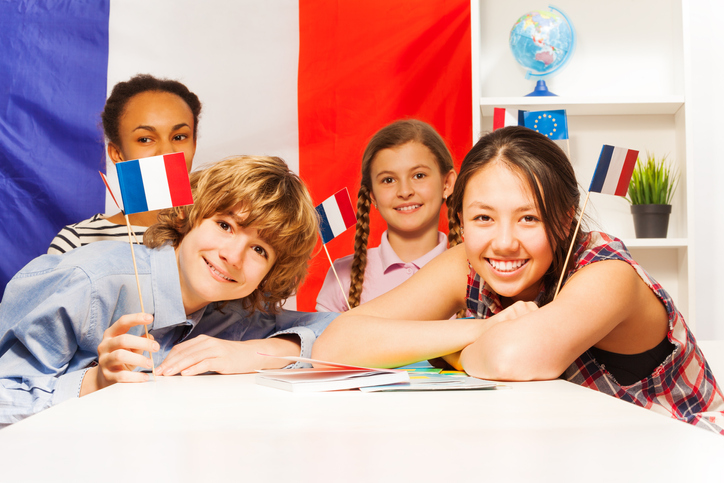
Learning French online connects children with kids their own age who know or are learning French through online forums.
Building such connections helps them make new friends with whom they can speak French. This makes learning French so much more exciting and engaging.
5. It’s fun!
It’s not news that children love to play games. Learning French online provides instructors the option to gamify the learning process to make it fun and interesting for kids.
6. Receive French lessons from home
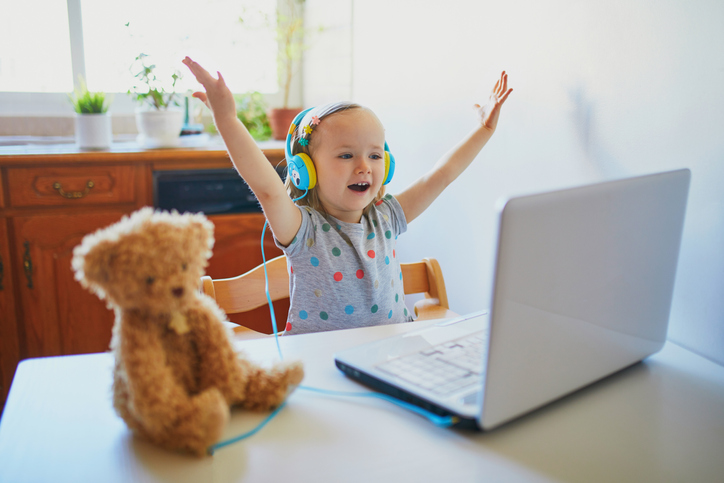
Learning French online allows children to receive French lessons from the comfort of their home.
Additionally, you know your child’s learning style better than anybody else. Whether they learn better with pictures, rhymes and music, games, etc., you can help personalize the learning experience for them.
LingoCircle can help instill the love of learning French into your child through our interactive and playful curriculum. We want our students to be excited to learn, explore different cultures and interact with one another.
You can start your free trial today!
At what age is it advisable to learn French?
Children can start learning from as young as 3 to 15 years old. LingoCircle offers small virtual meet-ups for these children where they can play games, read books, sing songs, socialize, all while learning the French language and the culture in a playful setting.

How to Raise a Bilingual Child
Hoping to raise a bilingual child? It’s an admirable goal with many proven benefits! However, as you may already know, it isn’t exactly easy. Creating a bilingual home takes significant effort, consistency, and commitment — especially if you aren’t bilingual yourself.
So, where do you start? How do you successfully give your child the best chance at speaking two languages fluently? In this blog post, we’re going to show you!
Specifically, we’ll look at:
- The benefits of bilingualism according to scientific research on language acquisition and child language development
- 5 essential strategies to raising your kids to speak two languages
- Frequently asked questions about raising bilingual kids and bilingual development
Let’s get started!
Benefits of Raising Bilingual Children
If you’ve ever traveled to a foreign country where you don’t speak the local language, we’re sure you already have some ideas about the benefits of raising a bilingual child!
Yet, your child being able to speak a foreign language with native speakers in a foreign country isn’t the only benefit. According to scientific research on bilingualism, the benefits of being bilingual also include:
- Cognitive advantages. Research has indicated that people who speak more than one language have better attention spans and an easier time switching between tasks.
- Social understanding. Scientists studying bilingual preschoolers found that bilingual children have an easier time understanding people who come from different backgrounds and have higher levels of emotional intelligence.
- Memory. Children who speak two languages have been found to have a better “working memory“, which gives them advantages with things like mental calculation of numbers and reading comprehension.
- Problem-solving skills. According to a study on bilingual toddlers, children who speak more than one language have better cognitive flexibility than their monolingual peers. This advantage makes it easier for those children to eventually solve complex tasks.
- Diversity. The ability to speak multiple languages gives children access to other cultures and diversifies their perspective of the world. Research suggests that this benefit can help your child more easily navigate intercultural relations.
5 Tips to Raise a Bilingual Child
Want your child to experience all of the benefits of bilingualism that we just discussed in the previous section? Here are 5 tips and strategies to help you raise a bilingual child.
#1 Start Introducing the Target Language to Your Kids Early
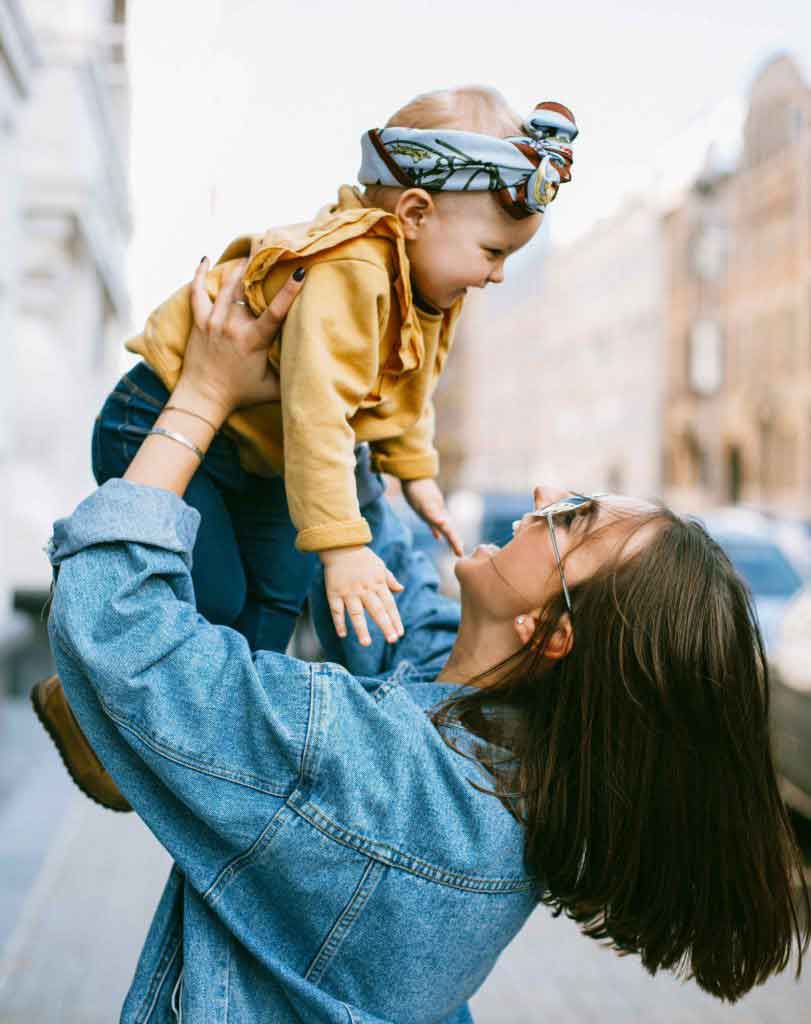
Did you know there is a “magic window” to teach your kids languages? Well, according to research on language development, your child has the best chance at learning a language between the ages of 0-8. This critical period is when their brain is most equipped to soak up and retain the sounds, grammar, and overall structure of the language.
Is it possible for your child to learn a second language after the age of 8? Of course! However, it will likely be more challenging. The earlier you start, the more likely you’ll be to raise a bilingual baby!
To work toward that goal, you can do things like expose your child to music and speak baby talk in the second language. As they grow, you can also try making short conversations, introducing them to cultural activities, and reading stories in the target language.
#2 Use a Single Strategy to Teach Your Kids a Second Language
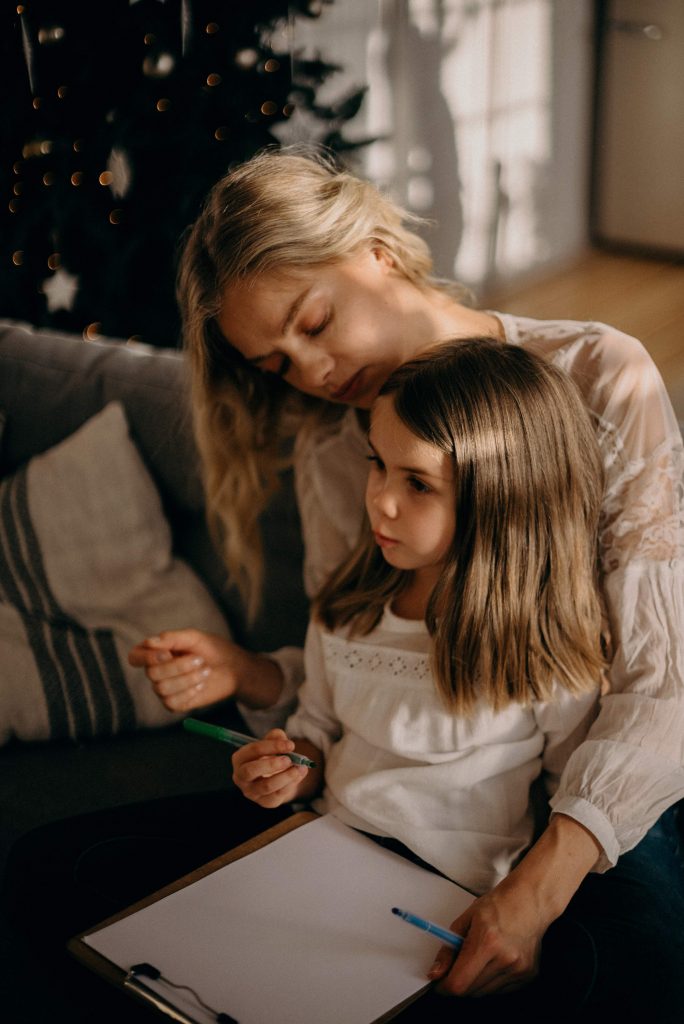
There are many tested strategies for raising bilingual children. For example, there is the one-parent one-language approach in which one parent speaks to the child in one language and the other parent speaks to the child in another language.
Since you’d create a truly bilingual home for your child, the one-parent one-language approach tends to deliver the most consistent results. However, it requires significant effort. The strategy may also be more difficult if both parents are not fluent in both languages.
The strategy you choose to teach your kids a second language is less important than how consistently you use it. If you introduce two languages to your kids, they need to know when they’re expected to speak each one.
#3 Focus on Quality and Quantity When Introducing a Language to Your Kids
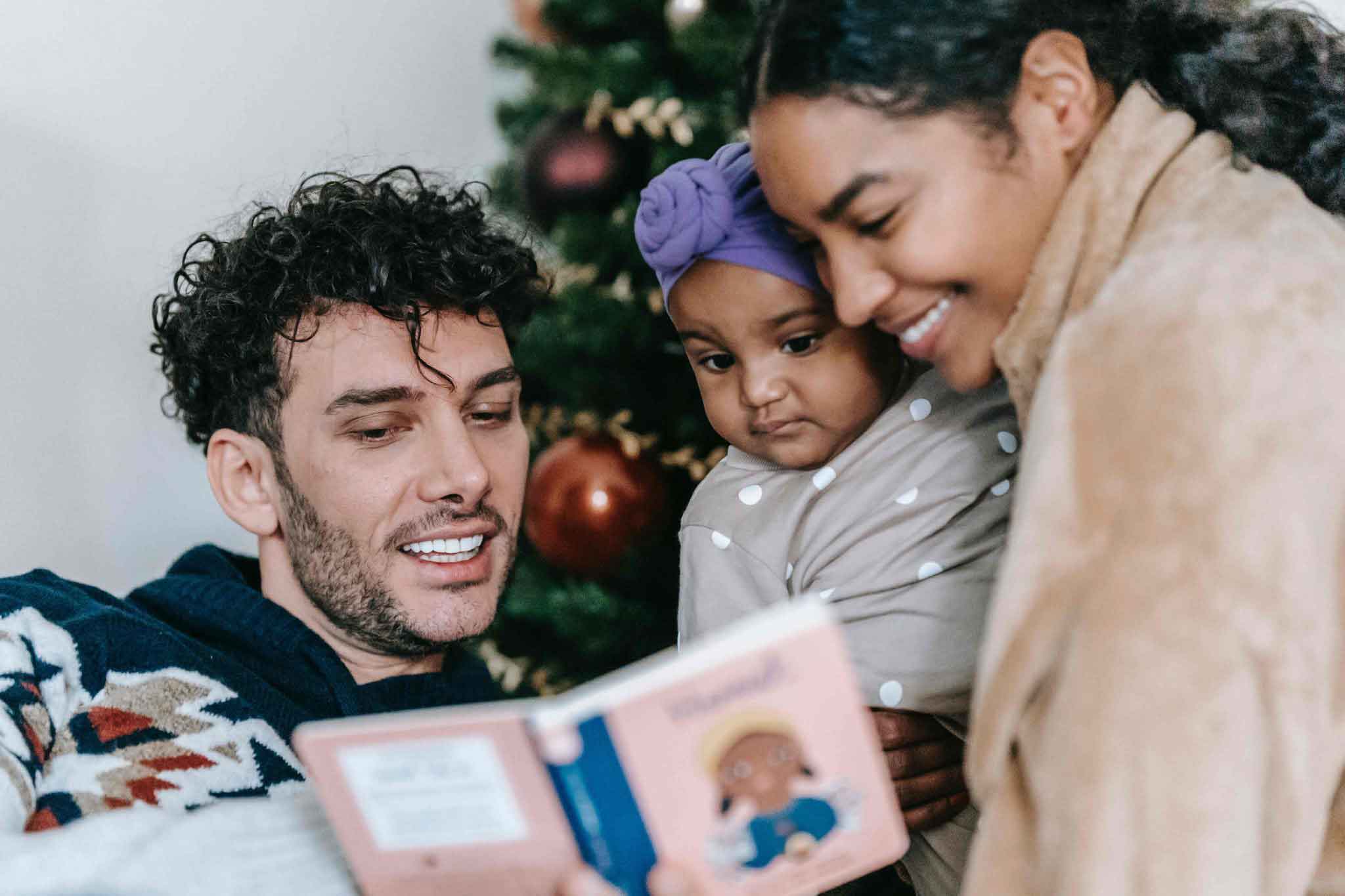
Will your child learn how to speak a second language just by listening to music or watching TV in the target language? Probably not!
The quality of language exposure is a critical factor in determining whether your kids truly become bilingual. Conversation and other interactive teaching methods like reading together are the best choices. Meanwhile, low-quality television shows are not particularly helpful for introducing a second language to your kids.
Quantity of exposure to the language is also important to build vocabulary and grammatical development. There is no secret, the more you speak the language to your child, the larger the vocabulary size.
#4 Get Help from Family, Friends, and Neighbors Who Speak the Target Language
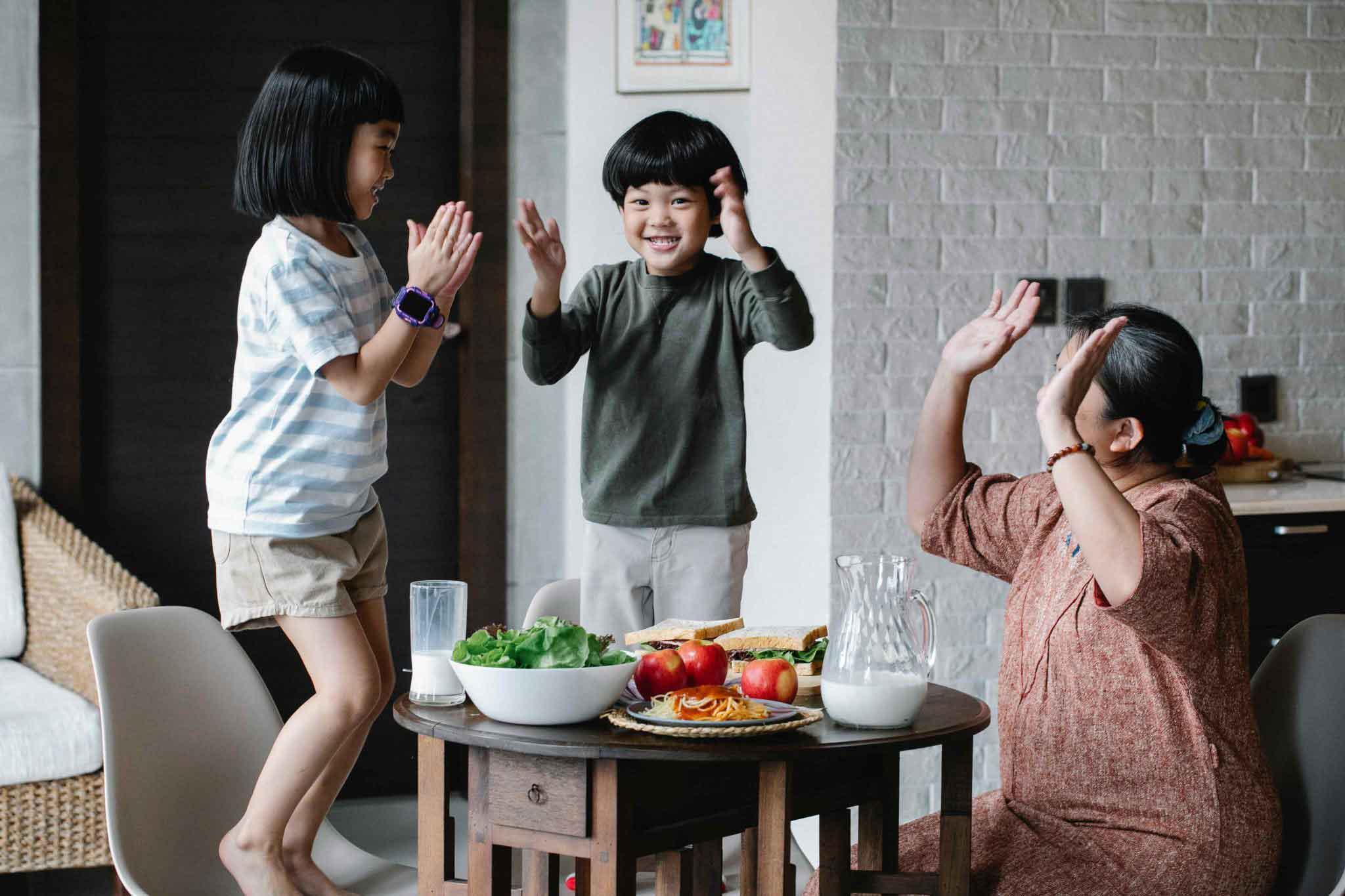
While you can teach your kids a second language alone, it’s easier with help. Ask your family to interact with your children in the language you are trying to teach. You can also ask your neighbors to help, particularly if you agree to do the same with their children.
Asking for help promotes variety in the second language. Your kids will have opportunities to engage with more people, thus introducing the language to your kids in different ways. Not only does this build second language vocabulary, but it also helps them understand how the language works on a fundamental level.
If you don’t know anyone who speaks the language, consider looking for a nanny or tutor who can. You may also want to look into enrolling your child in a school or program that offers bilingual education.
#5 Choose Bilingual Education to Teach Your Kids a Second Language
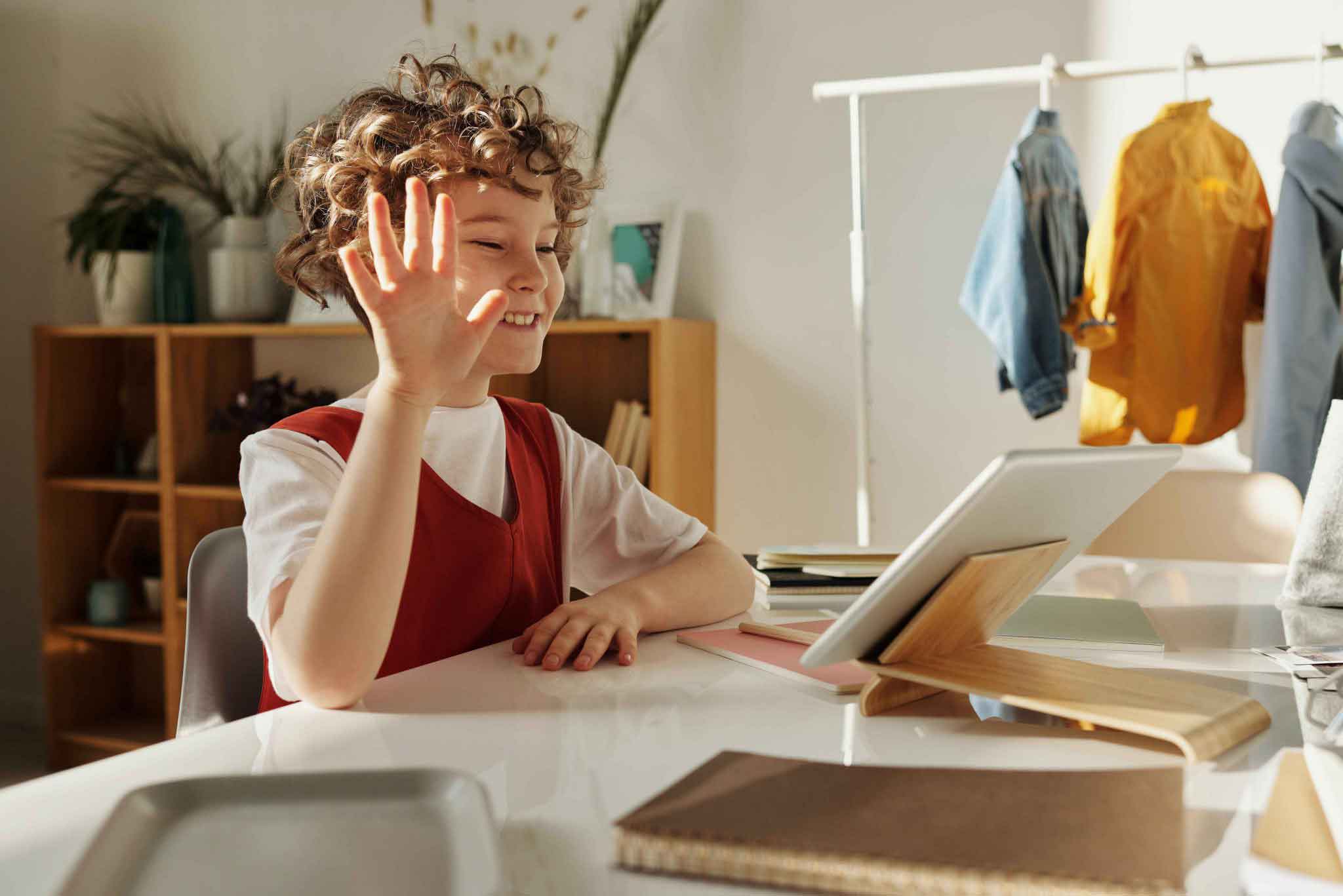
Working with a bilingual education program from an early age helps to truly immerse your kids in the second language.
Programs like LingoCircle offer online bilingual school and after-school programs with small class sizes and native teachers. During the classes, children have the opportunity to not only learn how to speak the second language but also things like:
- Learn to sing songs and read stories in the foreign language
- Improve communication in the language by interacting with other children
- Gain authentic exposure to fun cultural activities
Parents can increase the quantity of quality language exposure their child receives every day as early as 3 years old by choosing these programs.
FAQ about Raising Bilingual Children
Once you get started, we’re sure you’ll have many additional questions about how to raise a bilingual child. Here are a few of the most common questions parents have.
Is it possible to raise a bilingual child in a monolingual household?
Yes. Raising a bilingual child in a monolingual household is definitely possible! You’ll need to put in more effort to expose your child to the second language, but you can do things like enrolling your child in bilingual education programs to overcome this obstacle.
Is it too late to start raising a bilingual child if they’re already over the age of 8?
Not at all! As we mentioned earlier, early exposure (before the age of 8) to the second language is best according to research on language acquisition and development. However, that doesn’t mean all hope is lost if you have older children.
Anyone at any age can learn how to speak a different language. Older children learning languages will just require more time, effort, consistency, and exposure to the new language.
Will raising children to speak more than one language confuse them?
Many parents used to worry that bilingual kids experienced disadvantages due to needing to think in two languages. However, science has proven time and time again that this is not true.
Bilingual children are incredibly sensitive and perceptive of the differences between languages. Rarely are they confused or put at a disadvantage for speaking more than one language. In fact, as we showed earlier, the ability to speak two languages is actually an advantage!
Is code-switching normal or should it be discouraged?
Sometimes, people who speak multiple languages start code-switching. Not sure what that is? Basically, it’s when you mix languages in a single conversation or sentence. For example, someone who speaks English and French may start a sentence in French but occasionally use English words.
If you only speak one language, you may think it sounds odd or wrong when your child does this. However, it’s a completely normal part of the bilingual journey. People all over the world who learn to speak multiple languages from an early age do it.
Key Takeaways
Raising a bilingual child will take some work, but it’s definitely worth the effort! As we’ve shared in this blog post, children who can speak more than one language tend to have cognitive and social advantages over monolingual children.
If you want to help your child become bilingual, follow the 5 tips we’ve shared:
- Start introducing the target language to your kids as soon as possible
- Use a single strategy, like the one-parent one-language strategy, to create a bilingual home environment
- Focus on quality and quantity of exposure when introducing a new language to your kids
- Get help from family, friends, and neighbors who speak the target language — especially if it’s their native language
- Consider enrolling your child in a bilingual education program like the ones we offer at LingoCircle. Click here to get your child’s first lesson for free!

This month we’ve asked our French teachers the must-read classical French books for children 3 to 8 years old. Our teachers also gave us their favorite French books, the ones they love and that engage children the most. Teaching your kid French can start with a good classical French book that you can read over and over.
French Teachers recommendations of the Best French children’s Books
Mme Nadia:
In preschool, my must-read French classical books are:
- Le géant de Zéralda by Tomi Ungerer. This book helps introduce food and cooking vocabulary and has lots of interesting descriptions. The giant appetite of an ogre could only be satisfied by the flesh of children until young Zeralda tamed his taste buds with her culinary art. Great for 5-6 years old (Moyenne et Grande section).
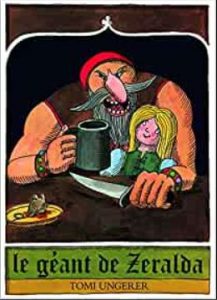
- La moufle by Florence Desnouveaux, adapted and illustrated by many authors. It is a story about animals that get bigger and bigger throughout the story and want to enter a mitten lying on the snow… in this book we learn to be polite and honest.
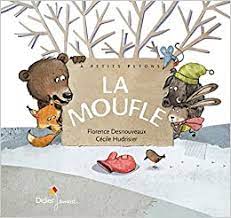
- J’aime la galette by Orianne Lallemand. This book revisits the well-known book “Roule galette” by adding to it very original recipes!! Many characters that in the end realize that the best “galette” is the one that is shared with friends.
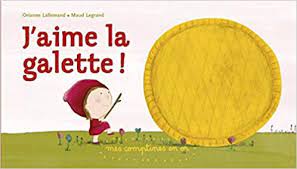
Then I really love the series by Geoffrey de Pennard such as “La galette à l’escampette” “Chapeau rond rouge” which are very funny revisited classical books.
A book I particularly enjoy and that kids love is “Chacun sa crotte” by Tara Gomi. Very humorous, it is a beautiful and colorful book which shows that everyone “fait des crottes” and that they are different depending on the animals. It’s funny and a nice idea to introduce the names of many animals…
My other favorites are “Prout de mammouth » by Noé Carlain and Anne Laura Cantone: it’s funny and the illustrations are beautiful. It also instills the sense of rhythm and phonological awareness to children. More appropriate for 5-6 years old (Grande Section).
Mme Sophie:
- Les trois brigands by Tomi Ungerer: one can look terrifying but have a big heart! A surprising and beautiful story.
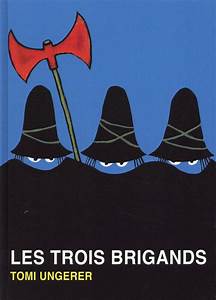
- John Chatterton détective, by Yvan Pommaux : immerse your child in a private detective universe, a red string and a tale.
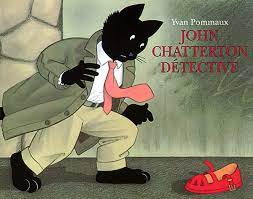
- C’est mon arbre, by Olivier Tallec. ”it belongs to me”, “it’s mine”, “it’s my game” …we hear that often as a parent! well in this story this little squirrel doesn’t want to share his tree. Until one day…
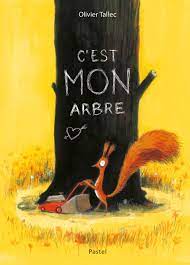
The following ones are not classical books but books that all kids love. I enjoy creating multiple projects around them.
- « La grenouille à grande bouche » for its repetitive structure and the rhymes
- « Les dragons adorent les Tacos” It is a book full of humor that kids from all ages love. Complement the book with a fun cooking session which will introduce new vocabulary all while having fun!
- “La mouette aux croustilles”
Mme Cecile:
For the classical books I think of:
- Cornebidouille by Pierre Bertrand: humorous, witty, cunning and a soup very hard to eat! We love acting this one out in our theatre workshops.
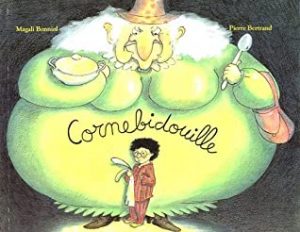
- Pétronille et ses 120 petits by Claude Ponti. The Claude Ponti series immerses its readers in a colorful world full of imagination!

- La belle lisse poire du prince de Motordu by Pierre Élie Ferrier, author also known as Pef. More appropriate for 6-7 years old when children learn to read and know some words. Pef’s book is full of humor and puns which you don’t notice the first time so you read it again!
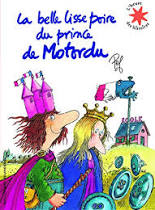
My favorites (there are so many but I must make choices!)
- “Quelle horreur!” by Claire Lebourg (my kids have a good laugh every time I read it! Each time Paty the butterfly must paint a friend, it’s a challenge, and it’s funny!)
(themes: arts, self-confidence, animals, humor..)
- “y-a-t-il des ours en Afrique ? » (Themes: friendship, skin, gender, culture, animals for Africa and the Savana, losing your plush animal: children identify themselves, solidarity)
- “L’Antartique de Simon” by Adrian Albert. Very nice book, children travel, discover new words and new landscape. Themes: Antarctic, polar animals, friendship between a white rabbit and a scientist
- « Raoul Taffin cosmonaute » a little boy full of imagination who makes us travel with him in space…but which space? Children get immersed right away and start imagining space.
Feel free to contact us with your comments. Maybe you also want to share gems from your bookshelves of French books for children.

One of the joys and burdens that every parent faces, regardless of circumstance, is the constant feeling of wanting to instill the values, skills, knowledge, and work ethic in their kids that is going to give them the very best chance of success.
There have been thousands of parenting books that aim to provide a blueprint for a child that can take on the world. Yet, every kid is different, after all. It’s very rare that you can find a general maxim that applies generally to most or all children. That’s why when you find one, it’s worth its weight in gold.
Bilingualism is one of those skills.
The science in the field is still relatively nascent, but many of the early results show that in terms of value, being able to converse and be fluent in two different languages from a young age is something that stands out from the rest. It’s the reason we started LingoCircle in the first place.
27% of children under the age of 6 in the USA are learning a language other than English and that number is only going to increase as people pay more attention to the benefits it brings.
In this article, we are going to run through some of the major benefits of learning to be bilingual from early on and how that gives you a huge head start as you start to grow up.
The Benefits of Bilingualism in Early Childhood
Cognitive Advantages
This one is hotly debated, but the research seems to bear out that bilingual children are able to switch between activities and focus areas more efficiently than their monolingual peers which is of great benefit in early development[1].
When everything is new and you are constantly changing contexts as you take in information, the ability to retain and apply this knowledge rapidly makes a big difference. A child who is switching between languages at an early age gets a lot of practice at this skill – which pays off significantly as they get older.
It doesn’t necessarily follow that your child is going to be smarter as a result, there are way too many factors to make that claim, but it does seem clear that the transitionary focus improvements will translate to some cognitive advantages that stand them in good stead for knowledge and skill acquisition.
This also seems to pay off in adulthood with bilinguals earning an average of $7,000 per year more than those who can only speak one language.
Social Understanding
As a child is developing, they must make the transition from the family home being their center of concern, to make their way into public spaces where they will engage with a range of other personalities. Just by having to switch contexts between two different languages, bilingual children can navigate a social world more effectively because they have an innate sense of how different others can be.
They intuit the fact that others might have different ideas, thoughts, preferences, and the like – because they speak different languages. It almost constitutes a larger ethical frame of reference as these children tend to be more empathetic to others who think differently than they do. Because they can recognize the contrast in themselves, they are much better placed to give the benefit of the doubt to others.
The science backs this up with bilingual preschoolers showing better understanding of others than their monolingual peers[2], and young bilingual children showing more sensitivity to tone of voice and other emotional intelligence indicators[3].
Memory
Bilingualism also seems to provide a statistically significant advantage in terms of memory consolidation – even from the age of an infant[4]. The challenge of dealing with two languages right from the beginning places a cognitive strain on the capacity for memory that helps to advance its development faster than if they were only learning one language. This is especially true for generalizing information from one circumstance to another, a bilingual kid will perform much better in this sort of task.
Problem Solving
Early bilingualism provides an advantage when it comes to problem solving that generalizes well beyond language itself and transfers to various other facets of one’s life.
- A brain that needs to decipher between two languages and form coherent sentences that match the context of the scenario is working much harder than one that relies on only one language and this extra effort leads to more resilient problem solving as time goes on.
- It’s a mix of self-control, determination, and cognitive flexibility that translates into a more adept and efficient problem solving mechanism as the child gets older. We shouldn’t have to tell you how big of an advantage this is in a modern world that is constantly shifting underneath our feet.
Diversity
One of the more indirect benefits of learning a second language is that it makes you more diverse as a person. A language is a gateway to another culture that opens up tremendous potential for learning and exploration if you take advantage of it. In the world today, we’re finally starting to come around and realize that diversity is a strength, and it creates fertile ground for some truly lifechanging epiphanies and experiences.
- By giving your child the gift of bilingualism, you are opening doors for them in the future that could completely transform their experience of the world. It’s hard to see them in the early stages, because it’s not quite tangible yet, but they will reap those rewards in the decades to come as they venture out into a world that is filled with diverse people, cultures, languages, and worldviews.
- There is also neuroscientific research to suggest that this could really make an impact when it comes to intercultural relations of various types. If nothing else, you’ll child will be more interesting and curious as a result of having two languages to pull from.
[1] Bialystok E, Craik FIM, Luk G. Bilingualism: consequences for mind and brain. Trends in Cognitive Sciences. 2012;16(4):240–250. doi: 10.1016/j.tics.2012.03.001.
[2] Bialystok E, Senman L. Executive processes in appearance-reality tasks: The role of inhibition of attention and symbolic representation. Child Development. 2004;75(2):562–579. doi: 10.1111/j.1467-8624.2004.00693.x.
[3] Yow WQ, Markman EM. Bilingualism and children’s use of paralinguistic cues to interpret emotion in speech. Bilingualism: Language and Cognition. 2011;14(4):562–569. doi: 10.1017/S1366728910000404.
[4] Brito N, Barr R. Influence of bilingualism on memory generalization during infancy. Developmental Science. 2012;15(6):812–816. doi: 10.1111/j.1467-7687.2012.1184.x.

‘Tis the season to shop! We are all checking our lists, once and twice, looking to find unique gifts for our little ones.
Rather than the next toy that will get lost in the toy box, think about a gift that will stimulate your child’s mind. We’ve put together the perfect holiday shopping list of educational gifts for the young children in your life.
Educational Gift Guide for Preschoolers:
1# LingoCircle Gift Cards
If you’re looking for something that can genuinely expand your child’s development, try introducing a second language at an early age.
At LingoCircle, we specialize in teaching your preschooler French at this crucial developmental age. We’re a subscription based online bilingual school where your child can learn a new language with access to native language certified teacher and an expert built curriculum.
Whether you are a multicultural family wanting to introduce your second language to your kid or a monolingual family that want to teach a second language to your child at the best age, our program is tailored to every family profile and academic goals.
Your preschooler will be part of the same learning circle for each class, interacting and getting to know their dedicated teacher and classmates. Together, they’ll sing songs, play games, learn letters and read books. It’s a flexible solution for parents. Just pick a time and day that works for you. LingoCircle offers classes for children 3 to 12 years old combined with at home activities in a fun and interactive environment.
A LingoCircle gift card is the perfect option to try out our unique program. Gift cards come in one month subscription increments where you can choose from 1, 2, or 3 classes a week. It’s a fun, interactive way to teach preschoolers an exciting new language while engaging with other children their age online. Shop and give the gift of a new language to your family or friends today.
Looking for some expertly and thoughtfully crafted kits for your preschooler? We also love Montessori play kits and they are a great supplement to our program during weekend playtime.
They bring fun, developmental experiences straight to your home.
2# Lovevery
These expertly and thoughtfully crafted Montessori play kits will bring fun, developmental experiences straight to your home. They are designed by child development experts specifically for a child’s developing brain. Their toys are made with sustainably harvested wood, organic cotton and baby-safe plastics to ensure both quality and safety at every stage of your child’s development.
3# Kiwico
A kit from KiwiCo will inspire your little innovator. KiwiCo’s wide line of crates for kids from 0-14. With plenty of options that range arts and crafts to STEM-focused crates, each one brings an adventure with a side of learning that your kids will truly enjoy doing. These projects inspire children to become creative problem solvers. One of the biggest benefits of KiwiCo crates is that you can jump in and build and explore with your children.
4# Sagomini
Learning through play! It seems like the best way for children to develop, right? Sago Mini Box digital and physical toys are a unique selection of subscription boxes and apps designed to teach your child modern skills through play. Choose from a unique make and play subscription (we tried it and loved it!) or one of their award-winning apps that have made children laugh and learn throughout the world.
Final Thoughts:
Sometimes when we think about gifts for the children in our lives, we think about the immediate surprise or joy, but does it last? How often does a toy get unused or shoved to the corner when the next gift comes along? This year enhance your child’s mind with an educational gift they can appreciate throughout the year, and beyond.


Simple Ways to Learn a Second Language at Home
Get resources and tips to help supplement your bilingual education journey at home.
By providing your email you are signing up to receive emails from Bilingual Bebe. Privacy Policy
